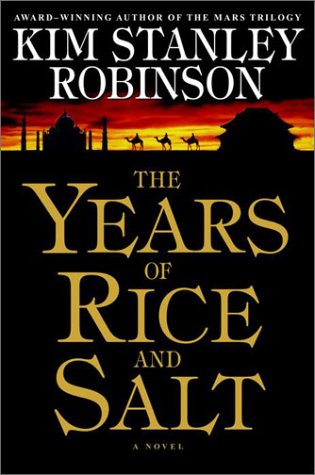The Years Of Rice And Salt
For the historical fiction reader, this review begins with a caveat: This is alternate history, a subgenre requiring some initiation. Imagine that instead of killing one third to one half of the population of Europe in the fourteenth century, the bubonic plague wiped out nearly everyone. For all intents and purposes, Christianity has become just a blip on the screen; Chinese and Islamic empires are left to divide the continents between them. Imagine how history rolls on from there. If you have an imagination as vivid and fertile as Robinson’s, you end up with The Years of Rice and Salt.
Having given that warning, I can say without qualification that this is a beautiful book. Time charts and maps are provided and necessary as the mind tries to negotiate this unfamiliar territory–we’re not even talking the same calendar here. And we’re also not talking about just the lifespan of one set of characters. These people reincarnate through slave and tiger and princess and otherworld rebel and something very like a modern professor at UC Davis in a Chinese Central Valley of California given over completely to rice paddy. Modern nuclear theory is discovered in terms of chi. Writing style changes subtly from poetry to Buddhist epic to alchemical tract. A hint: each character reincarnates to a person, whether Islamic or Confucian or Native American, whose name begins with the same letter. But the mind expands in wonderful ways as it makes these negotiations.
Scene after beautiful scene unfolds in this exotic yet strangely familiar landscape. I am haunted by the Balkan man, lone survivor of all his people, trying to describe how the plague killed everyone he knew to another lone survivor. He will never have another human being understand his language in his life. Being no great fan of war stories, I thought I might pass when WWI trench warfare moves to the Himalayas and Mount Everest crumbles to make the mud for our soldiers to slog through. Then we are made to wonder if this isn’t earthly battle. Our heroes may have already died and, horror of horrors, the conflict continues in the world beyond. I was perhaps most touched by the depiction of a Chinese woman poet–exquisite female writing from a guy, which may be my highest compliment. She describes the various stages of her life: the coddled childhood, the glories of being a bride, the harrowing births of children. But of them all, she loved the middle years, the every-day-the-same but warm and wholesome daily pots of rice and salt.










